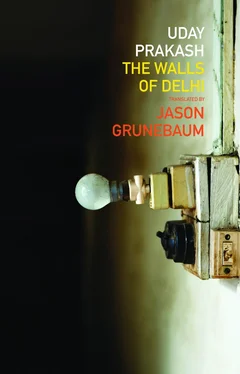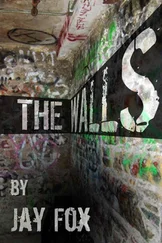I noticed his lips were cut badly and he was missing some teeth; they must have smashed them out in the police station. He could barely put two words together.
‘Whoever wants to be Mohandas, let him be Mohandas. I am not Mohandas. I never did a BA. Didn’t come out on top of my class. Never was fit for work. Just want to live in peace. Leave me be, no more beatings. If you want something, take it. Take what you need and fill up your homes. But leave me to my life and toil. Uncle, please stand by my side.’
It came out that Mohandas’s eleven-year-old son Devdas hadn’t been home in ten days. Some said that Bisnath had him disappeared, others said he’d fled to Mumbai in fright.
Still others claim to have seen him in the jungles of Bastar.
(It was the time when at the top of a hillside near Bharuch stood a thirty-year-old Dhanuhar archer named Raghav. Night after night he’d stay up late whittling down shaft after shaft of bamboo into arrows. He drew the bowstring taut and shot arrows at the sky, then ran down the hill to retrieve the arrows that’d come back down.
Again and again and again — countless times he fired arrows at the sky and retrieved them from the dirt.
But then the arrows began to be submerged under water, and it became difficult to find them and pull them out. The fields of the valleys that lay between the mountains were filling up with water: inundated, a massive flood. Village after village began to go under, and trees, too. North and south and east and west were going under; all memories were going under.
Yet thirty-year-old Raghav kept shooting arrows into the sky and running down to retrieve them as long as he himself wasn’t swept under.
Where is Raghav now? Just where he was, where there’s now nothing but water. A vast, bottomless sea where electricity is created. There once was a hilsa fish in Bharuch. The greatest fish in the rivers of India, the most magnificent in the world. The hilsa is only able to survive in the fast moving current of a river.
The hilsa at the dam is sick from the polluted water, and has probably died.
It happened at the same time as when I was writing this story in a language that imprisoned me inside just like Iraqis were imprisoned in Abu Ghraib. Or like Jews in 1943 were imprisoned inside a German gas chamber. Or like a drowned hilsa fish in dirty, stagnant, polluted waters. Or right now like Raghav Dhanuhar, still fighting.
This was the time of Mohandas, of you, of me, of Bisnath, of what we see this very day when we look outside our windows.
And the time everybody knows as the first decade of the twenty-first century, when all of us were celebrating the one hundred and twenty fifth anniversary of the birth of Premchand, the King of Hindi Fiction.
But really, tell the truth: Doesn’t the name of Mohandas’s village, Purbanra, remind you even a tiny bit of the Mahatma’s Porbandar?
— This story is dedicated to Laghve,
Paul and Shailendra—
A PREFACE TO THE END OF TIME
(Reading this preface is mandatory)
This is the story of Chandrakant Thorat. It’s also my story.
And it’s a story that takes place in the present day, in our own time, a tale with the sights and sounds of this day and age. A few of the characters have been cast out of their own space and time, and now stand in wait for the destruction at the end. I am one of them, living outside of my proper space and time, in a filthy quarter far from the finery and culture of the city. The efforts of human beings to lead lives in the shanty towns that circle the city on grabbed land eventually take shape, one unfortunate day, on the maps of a town planner, or property dealer, or urban coloniser. Then, the engineers of the empire of money send out the bulldozers — they fan out, non-stop — until even a dirty sprawl of shacks is transformed into a Metro Rail, a flyover, a shopping mall, a dam, a quarry, a factory, or a five-star-plus hotel. And when it happens, lives like Chandrakant Thorat’s are gone for good.
***
Chandrakant Thorat is a friend of mine, and he’s one of the characters of this story. My life is bound to his as if by decree or fate. Even if I didn’t want it to be so, it would be.
You ought to know the truth: there are only two reasons lives like ours are stamped out. One: our lives are left over as proof of past and present sins and crimes against castes, races, cultures; they always want to keep this as hidden as they can. Two: our lives get in the way of the enterprising city, or act as a road bump in the master plan of a country that thinks of itself as a big player on the world stage. Our very humanity threatens to reveal the wicked culture of money and means as something suspect and unlovely. That’s why whenever civilizations once developing, now on the brink of prosperity, decide to embark on a program of ‘beautification’, they try to root out such lives, the same way the mess on the floor is swept outside.
Suppose we fled these megalopolises to an exurb, or to the mountains, or into the forest, or to a small town? There, too, lives like ours would one day be inundated and swept away, just as the Harappan or Babylonian civilizations you must have read about in archeology books were also wiped out.
The memory of the destruction at the end of time lies in the psyche of every community of every people, including ours.
There is something else you should know. Whenever our lives are steamrolled in the name of cultural progress and cultural beauty to profit the rich city or state; or when lives drown for power and energy: it’s not just us. The deer, butterflies, birds, elephants, pipal and teak trees, the flora (divine beings all) are also washed away from this earth. Beings that descended from heaven, thousands of years ago, in the ancient treta or dwapar epochs; beings that settled into rocks and books so that our suffering might be eased. To allow us to endure our pain and desolation. To light our way like a candle or firefly or light bulb in the darkness. When violence permeates everything, and reality has become a nightmare, these creatures carry us into a dream.
You know the truth: none of it is meant for us. Not the medicine of rich, developed nations that give relief from suffering, or the energy that creates the illusion of light and wind and words and dazzle — none is meant for us. Top-tier hospitals, banks, institutions, parliaments, courts, airports, and wide boulevards aren’t for us. We’re chased away from these places, or crushed underfoot.
Only they may inhabit the buildings and institutions built by civilizations of wealth. Their constitutions only serve to protect their interests. Their language of poetry and legend is covered with our blood, sweat, sorrow, and tears.
Their poems and epics aren’t ours. They want to keep us out of everything: poetry, prose, music, cities, work, industry, the marketplace. We’re the drudging, untouchable, poor, unemployed, dissatisfied, anxious, and hungry people who, to them, are utterly unknown. They despise us each and every moment; each and every moment, they wish to do away with us.
***
What do you think? In 2003, could what’s happened in Afghanistan, Iraq, Bosnia, or what happened in the middle of the twentieth century in Hiroshima-Nagasaki, Korea-Vietnam, or what happened two-and a half thousand years before Christ in Mohanjodaro, Harappa or Mesopotamia, or what’s happening right now, as I’m writing these lines, in Karbala, Baghdad, Fallujah, Najaf, Nasiriyah or in the Gaza strip — is it so different from what’s happening in Delhi’s Gurgaon, Noida, Silampur, Bhilasava, Rohini, Jiyasaray, Mahrauli? Or different from what’s happening on the banks and shores of the rivers Narmada, Son, Betava, Krishna-Cauveri, Dajla, Yangtzee, Amazon, Volga, Mississisppi, Jambeji, Thames, Nil, Sindhu, Ganga, Tungbhadra, and Kosi?
Читать дальше










